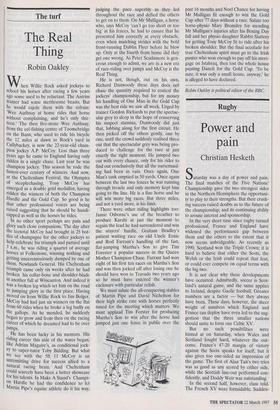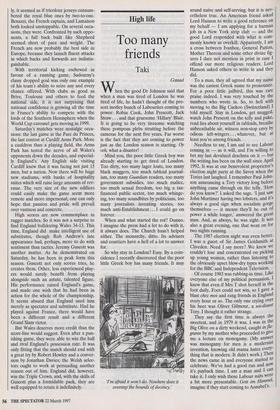Rugby
Power and pain
Christian Hesketh
Saturday was a day of power and pain. The final matches of the Five Nations' Championship gave the two strongest sides in the Northern Hemisphere the opportuni- ty to play to their strengths. But their crush- ing success raised doubts as to the future of the championship, and its continuing ability to arouse interest and sponsorship.
In the very short time since rugby turned professional, France and England have widened the performance gap between them and the others to the extent that it now seems unbridgeable. As recently as 1990, Scotland won the Triple Crown; it is hard to believe that either the Scots, the Welsh or the Irish could repeat that feat, or could ever compete on equal terms with the big two.
It is not clear why these developments have occurred. Admittedly, soccer is Scot- land's natural game, and the same applies to Ireland, despite Gaelic football. Greater numbers are a factor — but they always have been. These days, however, the sheer weight of numbers which England and France can deploy have even led to the sug- gestion that the three smaller nations should unite to form one Celtic XV.
But no such possibilities were hinted at on Saturday, when Wales and Scotland fought hard, whatever the out- come. France's 47-20 margin of victory against the Scots speaks for itself, but it also gives too one-sided an impression of the game. The first of Alan Tait's two tries was as good as any scored by either side, while the Scottish line-out performed con- fidently, and Doddy Weir was outstanding.
In the second half, however, class told. The French XV were formidable. Sudden- ly, it seemed as if tricolour jerseys outnum- bered the royal blue ones by two-to-one. Benazzi, the French captain, and Lamaison both looked unstoppable. On several occa- sions, they were. Confronted by such oppo- nents, a full back built like Shepherd seemed short of pace and weight. The French are now probably the best side in Europe, because they launch fluent attacks in which backs and forwards are indistin- guishable.
With territorial kicking eschewed in favour of a running game, Sadourny's classy dropped goal was only one example of his team's ability to seize any and every chance offered. With clubs as good as Brive, Toulouse and others to feed the national side, it is not surprising that national confidence is growing all the time in France's ability to compete with the lords of the Southern Hemisphere when the World Cup carousel gets moving in 1999.
Saturday's matches were nostalgic occa- sions: the last game at the Parc du Princes, the last contest at Cardiff Arms Park. More a cauldron than a playing field, the Arms Park has tested the nerve of all Wales's opponents down the decades, and especial- ly England's. Any English side visiting Cardiff knew that it was facing not just 15 men, but a nation. Now there will be huge new stadiums, with banks of hospitality suites which will raise large amounts of rev- enue. The very size of the new edifices could easily make the game seem more remote and more impersonal; one can only hope that passion and pride will prevail over vastness and concrete.
High scores are now commonplace in rugger matches. So it was not a surprise to find England bulldozing Wales 34-13. This time, England did make intelligent use of substitutes, though Rob Andrew's late appearance had, perhaps, more to do with sentiment than tactics. Jeremy Guscott was another matter. As he demonstrated on Saturday, he has been in peak form this season. Guscott not only scores tries, he creates them. Other, less experienced play- ers would surely benefit from playing alongside such an astute, talented figure. His performance raised England's game, and made one wish that he had been in action for the whole of the championship. It seems absurd that England used him merely as spectator and substitute. Had he played against France, there would have been a different result and a different Grand Slam victor.
But Wales deserves more credit than the score-line would suggest. Even after a pun- ishing game, they were able to win the ball and rival England's possession rate. It was only fitting that the match should end with a great try by Robert Howley and a conver- sion by Jonathan Davies; the Welsh selec- tors ought to work at persuading another season out of him. England did, however, win the Triple Crown, and, with the skills of Guscott plus a formidable pack, they are well equipped to retain it indefinitely.



































































 Previous page
Previous page